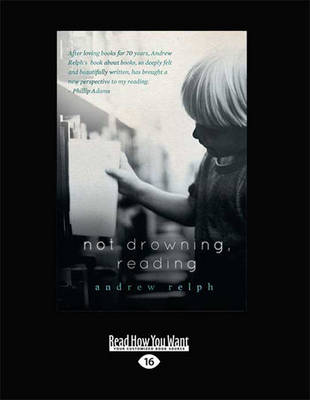Reviewed by Michael @ Knowledge Lost on
The title Not Drowning, Reading is a fascinating one and also comes with an interesting backstory. It references a time the author almost drowned but also is a perfect metaphor for how Relph felt during his school years struggling with a reading disability. A feeling of struggling to keep his head above water and not get lost in the depths of the educational waters seems to give me an idea of the battle he was having internally. It is interesting to think that he went from an internal battle into a career helping others with psychological struggles.
Divided into essays on his life, Andrew Relph explores the impact literature has had on his life with continual references to his career as a psychoanalyst. Considering I have an interest in psychoanalysing literature, this was a fascinating read for me and gave me plenty to think about. Relph shares his love for authors like Martin Amis, Saul Bellow, William Shakespeare, Virginia Woolf and to my disappointment D.H. Lawrence. In fact his thesis was centred on Lawrence and the psychoanalysis.
For those people who don't know, I consider Lady Chatterley's Lover by D.H. Lawrence as one of the worst books I have ever read. I will admit that I just didn't get the appeal and have never returned to Lawrence again. There are plenty of reviewers I respect and trust that love the works of D. H. Lawrence and while I hate to admit this, I feel like I need help in understanding the appeal. Lady Chatterley's Lover was read when I first started out as a reader and there would be a lot I missed but I also suspect that it wasn't the best starting point for me as a reader.
Now I have had a rant about D.H. Lawrence, I should return to Not Drowning, Reading by Andrew Relph. This memoir is a very deep look at his life and literature through the lens of psychoanalysis; this reminds me I need to learn about these literary theories but for others it might come across as a little dense. I was completely immersed and fascinated by what Andrew Relph had to say but I am well aware that compared to other memoirs about literature this might be too heavy on theory for some readers.
This review originally appeared on my blog: http://literary-exploration.com/2014/12/07/not-drowning-reading-by-andrew-relph/
Reading updates
- Started reading
- 11 November, 2014: Finished reading
- 11 November, 2014: Reviewed
